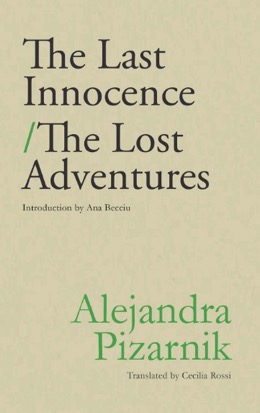Review of The Last Innocence / The Lost Adventures
The Last Innocence / The Lost Adventures
by Alejandra Pizarnik
Translated by Cecilia Rossi, Introduction by Ana Becciu
Ugly Duckling Presse $15
A Tradition of Rupture: Selected Critical Writings
by Alejandra Pizarnik
Translated by Cole Heinowitz
Ugly Duckling Presse $18

As part of their Lost Literature Series, Ugly Duckling Presse has published two new translations of work by the Argentinean poet Alejandra Pizarnik. The Last Innocence / The Lost Adventures combines Pizarnik’s second and third books (although, as Ana Becciu explains in her lyrical introduction, Pizarnik herself considered them her first and second books after she disavowed her first book, The Most Foreign Country, as not representative of her new voice). A Tradition of Rupture includes prologues, interviews, essays, and articles, and essentially represents the translator’s selected version of her Prosa Completa, the first volume of her prose to be published in English. These two books appearing at the same time create a portrait of Pizarnik that until now would have been entirely unavailable to English readers.
The Last Innocence and The Lost Adventures are “early” collections, but in the context of a writer who died when she was only thirty-six. Although Pizarnik felt the turn she made in these books away from the style and concerns of her first book, published when she was only twenty, were significant enough to justify the first’s disavowal, in fact all three books were published within a three-year period. They are the poetry of a very young woman full of the intensity of her talent and tormented by depression. Most of the poems in these collections speak to her mental pain and many directly to her struggle against suicide. A Tradition of Rupture, by contrast, contains prose from a wider span of time. In this volume it is possible to observe the prose voice of a poet who has, to some degree, arrived in her career, wielding the authority of literary criticism and her own literary recognition with aplomb, wit, and open disdain for writers, writing, and politics she found inadequate. If she comes across as tormented in her poetry, she is almost lofty, seemingly invincible in her prose.
The best example of the disdainful humor she could employ is in “8 Questions for Women Writers, Actors, Scientists, Artists, Social Workers, and Journalists.” It is disappointing that the translator didn’t include more contextual information about these pieces, so it’s unclear what organization wrote the questions and included her among their “8 Women,” but it’s irresistible to read her mounting impatience with the conservative framework of the questions that ostensibly examine “feminist” questions. The first question asks, “Do you believe that women should have the same rights as men in every sphere?” Pizarnik begins her response by saying, “Women have never had the same rights as men. They must come to have them.” The third question asks, “Do you believe sexual education is necessary?” to which she responds, “Of course—sex is difficult.” By the sixth question, “Do you support divorce?” she retorts, “Is it possible not to?” Finally, the eighth question asks whether she is aware of the struggle for women’s rights in the 19th and 20th century and if she is aware which countries were the first to recognize them. Pizarnik responds, “I ignore these matters.” This interview gives a sense of Pizarnik as nobody’s fool unwilling to brook the foolishness of others, but it also gives a sense of the suffocating conservatism and misogyny of her Argentina. It contextualizes her comment in the same piece that, “It is a curse to be born a woman, just as it is to be a Jew, to be poor, black, gay, a poet, Argentinean, etc. etc.” Pizarnik fell in an intersection of “curses” as a Jewish Argentinean woman poet working in the nineteen fifties.
Pizarnik’s contemporaries, Borges and Cortázar, as well as Pizarnik herself, are now established in Argentina’s literature as well as world literature more broadly, but we can get a robust sense of the claustrophobia of Argentina’s literary tradition during her career from her review entitled “A Ricardo Molinari Anthology.” In this surprisingly long piece, she admits that Molinari was once an “excellent poet,” but that most of his recent work gathered in the collection was “superfluous.” She goes on to excoriate the Spanish lyric tradition that she sees Molinari epitomizing, and in doing so suggests that relevant Argentinean literature will not be, or even strive to be, European, an incredibly disruptive claim for an Argentine to make about Argentina, particularly in the fifties. Ironically, she would move to Paris along with other Argentinean expats to be a part of surrealist and avant guard movements that permitted what we might call “American” or “Argentinean” writing that they found impossible in Argentina’s culture of European striving.
And yet Pizarnik asserts towards the end of that review, “For the word poetry to continue to have any meaning, one must condemn that mixture of conformity, complacency, and inauthenticity entailed by a poem cleverly assembled out of deadest clichés of a literary tradition and intended—like a political poem or any other poem that resorts to formulas and slogans—to flatter the most facile sentiments.” This speaks directly to her own poetry, which resists the easy politics of talking about politics, and indeed resists narrative generally. Pizarnik focuses on her interior experience of a world of surprisingly limited signs in her poetry. She is candid, when asked, about her obsession with certain words and images, discussing them multiple times in A Tradition of Rupture. Reading The Last Innocence / The Lost Adventures gives the reader an immersion in her inner life, moving as a brittle leaf through the wind that obsesses her, lacing her poems with a fierce chill she still somehow has a tenderness towards. Her obsession with wind, death, and her longing for life and its elements come together in the short poem, “Celebration in the Void.”

